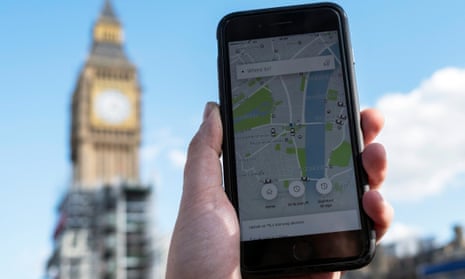Uber will be fighting for its future on two fronts this week, as the ride-hailing service attempts to reverse the revocation of its London licence while appealing against a landmark ruling on the way it engages its drivers.
The dual efforts will come against the backdrop of the company being branded a “disgrace” by the shadow chancellor, John McDonnell, while the Labour leader, Jeremy Corbyn, said Transport for London (TfL) had raised “serious concerns” about safety but suggested Uber would have an opportunity to “mend its ways”.
TfL, the London mayor’s transport authority, announced on Friday that Uber had been stripped of its London licence in a surprise move that dealt a serious blow to one of Silicon Valley’s fastest rising companies.
The move, which sparked an outcry from a coalition of customers, government ministers and the company’s drivers, also prompted Uber executives to adopt a more conciliatory tone as they look to appeal the ruling.
The chief executive, Dara Khosrowshahi, tweeted:
Dear London: we r far from perfect but we have 40k licensed drivers and 3.5mm Londoners depending on us. Pls work w/us to make things right
— dara khosrowshahi (@dkhos) September 22, 2017
Meanwhile, Tom Elvidge, the general manager of Uber in London, said: “We’re always willing to talk to Transport for London and the mayor. While we haven’t been asked to make any changes, we would like to know what we can do. But that requires a dialogue we sadly haven’t been able to have recently.”
The battle to reverse the licence ruling overlaps Uber’s efforts to appeal against a ruling regarding the employment status of its drivers, which will be heard at the employment appeals tribunal this week.
A UK employment court ruled last October that Uber drivers were not self-employed, as the company argued, but should be paid the “national living wage” as if they were directly employed. The decision was then described as a landmark ruling, which could affect tens of thousands of workers in the gig economy.
Last year’s case was brought by two drivers, James Farrar and Yaseen Aslam, on behalf of a group of 19 Uber workers who argued that they were employed by the San-Francisco-based company. The decision in their favour was thought to open up the possibility of claims from all of its 40,000 drivers in the UK, who are currently not entitled to holiday pay, pensions or other workers’ rights.
Uber said: “Almost all taxi and private hire drivers have been self-employed for decades before our app existed. With Uber drivers have more control and are totally free to choose if, when and where they drive with no shifts or minimum hours. The overwhelming majority of drivers say they want to keep the freedom of being their own boss.”

Comments (…)
Sign in or create your Guardian account to join the discussion